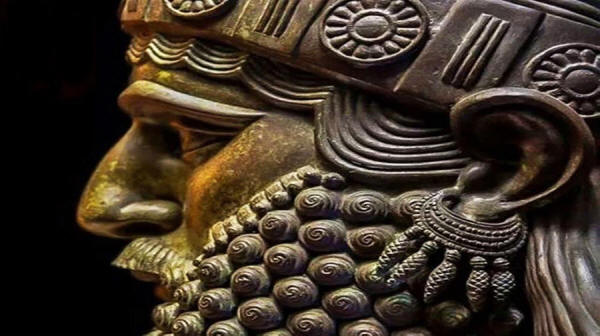|

by
Mystery History
June 26, 2017
from
YouTube Website

Many attributed the legend surrounding the great ancient King of
Uruk, and many of the cities written attributes to mythology.
Uruk said to had become famous as the capital city of the king
Gilgamesh, the Ancient ruler and hero of the Epic of Gilgamesh.
It is believed that Uruk was the biblical Erech from Genesis 10:10,
the second city founded by Nimrod in Shinar.
The Epic of Gilgamesh - written by a Middle Eastern scholar 2,500
years before the birth of Christ - commemorates the life of the
ruler of the city of Uruk, from which Iraq gets its name.
Uruk went through several phases of growth, from the Early Uruk
period (4000-3500 BC) to the Late Uruk period (3500-3100 BC).
The
city was said to have been formed when two smaller Ubaid settlements
merged. The temple complexes at their cores became the Eanna
District and the Anu District dedicated to Inanna and Anu,
respectively.
In 2003 just prior to the Iraq invasion which toppled Hussein,
astonishing discoveries were being made in Iraq, culminating in one
of the most extraordinary claims anywhere for centuries.
A claim
which American forces have been strongly accused of confiscating,
subsequently becoming the prime suspect as the driving force behind
a complete suppression of these astonishing discoveries within the
country.
In the April of 2003, Jorg Fassbinder, of the Bavarian
department of Historical Monuments, in Munich,
told the BBC World Service's
Science in Action program, quote,
"I don't want to say
definitely that it was the grave of King Gilgamesh, but it looks
very similar to that described in the epic."
"We found just
outside the city an area in the middle of the former Euphrates
river, the remains of such a building which could be interpreted
as a burial," Mr Fassbinder said.”
In
the book, Gilgamesh is
described as having been buried under the Euphrates, in a tomb
apparently constructed when the waters of the ancient river parted,
following his death.
He said, the amazing discovery of the ancient city under the Iraqi
desert had been made possible by modern technology.
"The most surprising
thing was that we found structures already described by
Gilgamesh," Mr Fassbinder stated.
"We covered more than 100 hectares. We have found garden
structures and field structures as described in the epic, and we
found Babylonian houses."
But he said the most
astonishing find was an incredibly sophisticated system of canals.
Here predictably is where the story goes silent… due to conflict
within the country it was largely believed the excavations had been
halted,
However, it seems that the discovery of King Gilgamesh may not have
been made in isolation, and apparently some onlookers were able to
record the event.
This footage was supposedly leaked to numerous places across the
internet, and has largely been put down as authentic footage of the
find, shortly after this was taken reports state that American
forces moved in and seized the find.
Why do
The Powers That Be see fit to suppress such discoveries, the
very real tombs of characters long thought to have been mythical?
Osiris being but one example among many which have undoubtedly been
hidden from the public.
Maybe some clues to why his tomb has been hidden, lay within the
epic, and the immense powers Gilgamesh was said to have possessed.
He was the 5th king of Uruk and his power was so mighty, many
believe that the stories surrounding him are just myths, that were
built around his seemingly super human strength and endurance.
However, serious scholars concluded that the story of Gilgamesh was
nothing more than a fairy tale due to the astonishing story.
In The Epic the great king is thought to be too proud and arrogant
by the gods and so they decide to teach him a lesson, sending the
wild man, Enkidu, to humble him.
Enkidu and Gilgamesh, after a
fierce battle in which neither are bested, become friends and embark
on adventures together.
When Enkidu is struck
with death, Gilgamesh falls into a deep grief and, recognizing his
own mortality through the death of his friend, questions the meaning
of life and the value of human accomplishment in the face of
ultimate extinction.
Casting away all of his
old vanity and pride, Gilgamesh sets out on a quest to find the
meaning of life and, finally, some way of defeating death. In doing
so, he becomes the first epic hero in world literature.
The grief of Gilgamesh,
and the questions his friend's death evoke, resonate with every
human being who has wrestled with the meaning of life in the face of
death.
Although Gilgamesh
ultimately fails to win immortality in the story, his deeds live on
through the written word and, so, does he.
-
Is this below leaked
footage of the tomb of Gilgamesh?
-
Regardless of its
authenticity, why all the secrecy?
-
Are we as a
species not capable of being presented with things, which
test our core beliefs, without erupting into chaos?
It seems for now we may
have to wait to find out...
Video
|


